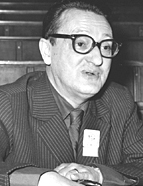

At a time when academic jargon consecrated research "networks" and "programmes" as a privileged means of organising scientific work, it should be noted that throughout the 1960s and 1970s, the Agrupamento de Estudos de Cartografia Antiga in Coimbra boasted two significant research programmes (on historical Cartography and Nautical Science), which resulted among other outcomes in this systematic edition of the technical literature of the Portuguese Renaissance, unparalleled in Europe. All this in an environment of the highest level of scientific cosmopolitanism: the network of international contacts of the two leaders of the Agrupamento covered those of the highest authority in these fields, relying in particular on the close collaboration of top names such as Reyer Hooykaas and W. G. L. Randles.
Luís de Albuquerque was responsible for other editions that were crucial to the consolidation of the History of Nautical Science, and above all he wrote two major reviews of the Nautical Science of the Portuguese Renaissance: the first with two extensive chapters is part of the afore-mentioned volume II of the História da Cartografia Portuguesa [History of Portuguese Cartography] by Armando Cortesão; as wisely noted by Randles, the omission of his name on the cover of the work did not contribute to disseminating his work to those who might have been interested in him, but not necessarily in nautical cartography. This was offset by the accessibility provided to a wider range of readers through the publication of the work in English and, with it, those chapters. This was most likely the main channel through which his work became known in Anglo-Saxon historiographical circles, where it was widely recognised, since he left very little of his work written in English. On the other hand, the widespread international projection of this book by Cortesão is well-known, and is still today often quoted from the English version.
When asked by his closest friends why he did not write an extensive review of the Nautical Science of the Portuguese Renaissance, Luís de Albuquerque usually argued that he had nothing important to add to what he had written in those two chapters. But he would change his position: it was precisely a review with a global and systematic vision of Portuguese Nautical Science that he wrote to inaugurate the series of nineteen works on Portugal in the great collection on the Discoveries and the European Expansion. The Portuguese manuscript of the book Historia de la Navigación Portuguesa [History of Portuguese Navigation] (1992) was sent to Madrid very close to the end of the life of its author, who could not review it, and has remained lost to this day.
